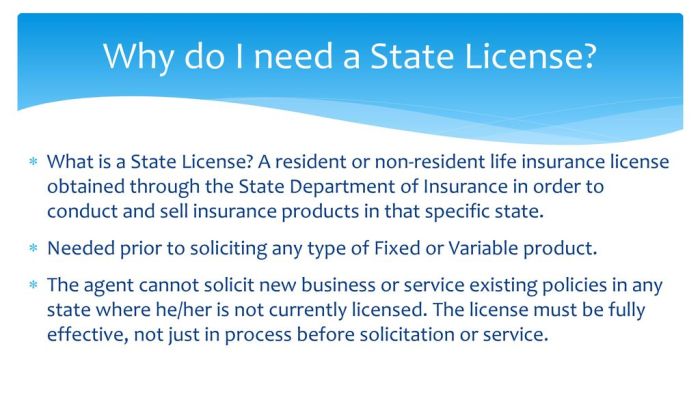When soliciting insurance a producer cannot – When soliciting insurance, producers are bound by a strict set of legal and ethical obligations. Understanding these prohibitions is crucial for ensuring the integrity of the insurance industry and protecting the interests of clients. This article will delve into the specific actions that insurance producers are prohibited from engaging in when soliciting insurance.
Insurance producers have a legal duty to provide accurate and complete information to clients. They must avoid making misrepresentations or providing misleading information that could influence a client’s decision to purchase insurance. Fraudulent practices, such as forging documents or intentionally providing false information, are strictly prohibited and can result in severe penalties.
Legal Obligations

Insurance producers have a legal obligation to act in the best interests of their clients. This includes providing accurate information about insurance products, advising clients on the best coverage options for their needs, and treating clients fairly and honestly.
Violating these obligations can have serious consequences, including fines, imprisonment, and loss of license.
Misrepresentation and Fraud
Misrepresentation is the act of making a false statement about a material fact. Fraud is the intentional misrepresentation of a material fact with the intent to deceive.
Examples of misrepresentation or fraud in the context of insurance solicitation include:
- Misrepresenting the coverage provided by an insurance policy
- Failing to disclose material information about the client’s risk
- Making false promises about the benefits of an insurance policy
The potential penalties for misrepresenting or defrauding clients include:
- Fines
- Imprisonment
- Loss of license
Conflicts of Interest
A conflict of interest arises when an insurance producer has a financial or personal interest that could influence their advice to a client.
Examples of potential conflicts of interest include:
- Selling insurance products from a company that the producer owns or has a financial interest in
- Receiving commissions from insurance companies for selling their products
- Having a personal relationship with a client
Insurance producers must avoid or mitigate conflicts of interest by:
- Disclosing any potential conflicts of interest to clients
- Putting the client’s interests first
- Seeking advice from an independent source
Coercion and Undue Influence
Coercion is the use of force or threats to compel someone to do something against their will. Undue influence is the use of a person’s power or authority to persuade someone to do something that is not in their best interests.
Examples of coercion or undue influence in the context of insurance solicitation include:
- Threatening to cancel a client’s insurance policy if they do not buy a new policy from the producer
- Using a client’s fear or vulnerability to sell them an insurance policy they do not need
- Pressuring a client to sign an insurance contract without giving them time to read it
The legal consequences of using coercion or undue influence include:
- Fines
- Imprisonment
- Loss of license
Unfair Trade Practices, When soliciting insurance a producer cannot
Unfair trade practices are deceptive or misleading practices that are used to sell insurance products.
Common unfair trade practices include:
- Bait-and-switch tactics
- High-pressure sales tactics
- False advertising
The laws and regulations that prohibit unfair trade practices include:
- The Unfair and Deceptive Trade Practices Act
- The Federal Trade Commission Act
- State insurance laws
The penalties for engaging in unfair trade practices include:
- Fines
- Imprisonment
- Loss of license
Ethical Considerations
Insurance producers have a duty to act in the best interests of their clients. This includes:
- Providing accurate information about insurance products
- Advising clients on the best coverage options for their needs
- Treating clients fairly and honestly
Insurance producers should also avoid conflicts of interest and refrain from using coercion or undue influence. By acting ethically, insurance producers can build trust with their clients and protect their own reputations.
Helpful Answers: When Soliciting Insurance A Producer Cannot
Can insurance producers solicit insurance door-to-door?
In most jurisdictions, insurance producers are prohibited from soliciting insurance door-to-door unless they have a prior relationship with the homeowner.
What are the penalties for misrepresenting insurance coverage?
Misrepresenting insurance coverage can result in fines, license suspension, or even criminal charges.
What should clients do if they suspect an insurance producer of unethical behavior?
Clients should report any suspected unethical behavior to the insurance regulatory authority in their state.

